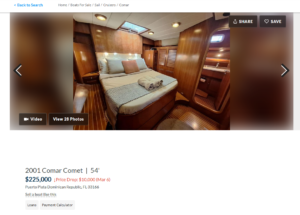Are you thinking to reward and upgrade your family lifestyle with the purchase of a used yacht? This article will outline the various considerations and steps taken in the used yacht buying process.
Used yachts come in many flavors and styles
After deciding what type of used yacht will suit your yachting lifestyle, the buyer will want to devote time to check various yachts for sale. The next step is to inspect a list of candidates with the help of your broker and then make a short list. Some folks are very analytical about this process, others know what they want as soon as they see it. Most are somewhere in between. Make sure the spouse is involved (if you have one) with decision making! Considerations to bear in mind are;
- The engine type (repair-ability considerations)
- Hours and age of the equipment (with some newer upgrades)
- Layout and interior furnishings
- Condition of the exterior
- Seaworthiness
- Market competition
Of course, all of this depends on your lifestyle, your budget and what you want to do. Be aware that your tastes may change as you get on different boats. Some folks may have a contemporary style home but decide that a traditional styled yacht appeals to them. Or vice versa.
Take a Look at our Variety of Used Yachts for Sale
We offer a unique database with many different categories of yachts and the different styles. These are all represented and verified as active listings. This is unlike many other popular sites which have a many ‘ghost listings’.
South Florida is a unique hub with many used yachts for sale. There is always a good variety of used yachts which can be shown in a short time and distance from each other. Most sellers realize this; thus this area is sought out for serious sellers. Just as in real estate, appointments and timely notice are often very important. This is because every seller/listing broker for a yacht have different rules for boat showings
Let’s make an offer
When it is time to make an offer for buying a used yacht, many buyers wonder if there is a specific rule for formulating an offer. You should bear in mind that each seller is different. The most serious sellers with the nicest yachts (the ones worth buying) often price their yacht at the front of the market with slimmer margins. After all, there are yachts just for sale and then there are those which are seriously for sale. Listings often ‘mature’ with the sellers becoming more motivated when they realize that they will need to follow the market. A buyer should note that the yacht seller pays any broker fees which won’t come out of your pocket.
The Agreement
Your yacht broker will be required to fill out a purchase and sales agreement for your review and signature. Suggestions which help the broker ‘sell’ your offer’ include:
- A deposit in place
- A timely period of time to complete the deal (we normally suggest 30 days or less)
- No trade-ins
- Financing in place (or approved).
AK Yachts uses a Purchase and Sales agreement which has been developed by the IYBA (International Yacht Brokers Association). This was formed with the cooperation of the best maritime attorneys in the yachting industry. Buyers for larger yachts will likely seek a maritime attorney who specializes in yacht transactions; who will often participate in the purchase agreement, escrow deposit and registration process of the used yacht.
The Deposit
Often, negotiating will take a few days or so to come to an agreement. At this point the Seller will sign the agreement with the expectation for a deposit to be implemented to act as ‘consideration’ for the deal. 10% is the normal deposit and can be placed in either the Buyer’s broker escrow account. For larger deposits, with an attorney who will act as escrow agent. Special note should be made for Broker escrow account. The State of Florida mandates and regulates yacht brokers very carefully and requires no co-mingling of escrow funds as well as ensuring that the yacht broker carries a surety bond.
Buyers and Sellers should both realize that in the event of a dispute between themselves, the escrow agent will likely turn over the deposit to the appropriate court of jurisdiction for further resolution. However, this event very rarely happens as the buyer will either accept the vessel, whereby the deposit becomes non-refundable and is applied to the purchase price. Or, the buyer will reject the vessel whereby the deposit is refunded, and the agreement is terminated without further responsibility by the buyer or seller.
Now is the Time for Due Diligence
At this point, the yacht for sale is officially “off the market” and the seller cannot legally sell her to any other buyer until the terms of the agreement have been concluded. The buyer (with the broker’s help) is encouraged to perform due diligence in order to estimate any defects with the boat. Numerous companies which specialize in surveying yachts and their machinery are available, especially in South Florida.
Frankly there are good ones, mediocre ones and not such good ones. Any experienced yacht broker will have a short list of surveyors which he feels will do a good job for the buyer for a particular type of yacht. This is because surveyors often have specialties in different used yachts and know what to look for right away. I would encourage engaging a surveyor who specializes in the type of yacht to be purchased –with a background of doing a thorough job and who can discuss defects intelligently with a buyer. This is rather than a surveyor who specializes in a completely different category of yachts.
Survey Costs
Survey prices are typically around $30/foot for mid-sized hull surveys and go up from there for surveying larger yachts (as they take more time). Buyers should note that while a hull surveyor will be able to record observable machinery operation; we recommend a separate engine surveyor should be engaged. One which specializes in the particular equipped brand of engine and genset package.
The survey also includes hauling the yacht out for a bottom inspection at the cost to the Buyer.
Prices for engine surveyors typically run in the $1,000-1,500 range including oil sampling. Once the survey is concluded, the surveyor(s) will provide written reports detailing the equipment and recommendations.
What to Expect from a Survey
Special note should be made that while a qualified surveyor will find most of the defects. The possibility exists that other issues may arise down the road; just as in any piece of complex equipment. A safe estimate is that a competent surveyor will be able to find at most 90-95% of the various deficiencies found in most yachts. And certainly any crucial ones.
The survey is not only important to the buyer in order to establish the real condition of the yacht, but essential to insurance companies and necessary to bind the yacht with an insurance policy.
Armed with a good survey, the buyer determines that he can live with the defects (which will be hopefully minor) or seek some restitution on the purchase price for any substantial defects. This stage often requires fair-minded willingness on both parties. Once the buyer and seller agree to terms, the yacht is ‘accepted’ and the deposit ‘goes hard’ (or in other words, is non-refundable and applied to the purchase price). Naturally, if a deal is not reached, the Buyer may reject the vessel, cancel the deal and get the deposit returned (less any outstanding costs).
Closing the Transaction
Now the time comes to determine a variety of issues which are crucial to the closing of the yacht. An insurance agent should be engaged and a policy should be decided upon with a binding date to coincide with the closing date. A documentation company (or maritime attorney for larger yachts) should be engaged at this point. The agent will seek any liens on the yacht including those implemented by financial institutions which must be financially satisfied at closing.
Bank loans complicate matters, and sufficient time must be allowed to pay them off and in turn have the lien released – or conversely a finance institution will need time to approve the loan.
The agent (or attorney) will then prepare the proper documents needed for the transfer of ownership, which is often held in escrow until the funds are transferred to satisfaction of the owner/lien holders. There are a variety of ways to title a yacht (see article on yacht registrations/titling) and register a yacht depending on the buyer’s circumstances and residency.
Funds and Tax
The ‘closing’ is often handled long distance with wire transfers of funds. There was a time before the State of Florida legalized a sales tax cap of $18,000 for yacht sales (6% up to $300,000). Then; many yacht buyers chose to register and ‘flag’ the yacht offshore in a country which offers the best maritime advantages. Thus the yacht closing often took place in a foreign country (such as the Bahamas). This practice is still used (once again depending on buyer circumstances), however not as frequently. Florida offers one of the best and least expensive tax options now.
Why a Broker?
Most experienced yacht buyers recognize the complexity of buying a yacht and rely on an experienced yacht broker to assist them. As do experienced sellers. It is quite rare to see transactions handled by individual buyers and sellers above 40’ due to the factors involved.
Once the yacht is officially closed, it is time for celebration and the beginning of a new lifestyle. Now it is time to embrace family/friendship experiences, privacy and exploration. Let the good times begin! Note that always see to improvements, repairs and modifications which new owners want to make…at a fair price! This separates Ak Yachts from the rest of the crowd! We specialize in ensuring that all of these things are taken care of as part of our ongoing service!
Remember that:
Yachting is the Ultimate Lifestyle!
A note: I welcome emails with questions or feedback anytime! Any ideas for blog-worthy topics are also welcome! andy@akyachts.com; (954) 292-0629 cell. Visit www.akyachts.com.





